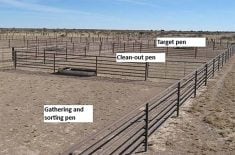STETTLER, Alta. – Canadian wheat board commissioner Ken Beswick says he’s a champion of free enterprise and a persistent critic of his employer.
On the other hand he supports the principles of the wheat board and believes single desk selling has advantages.
Debating reform of the wheat board with Western Canadian Wheat Grower chair Pat Durnin of Kathyrn, Beswick said farmers need to realize who their true competitors are.
“We are, to some extent, weaker by directing so much of our time and energy and money at arguing with one another instead of understanding that the real adversary is the marketplace,” Beswick said.
Read Also

Feeder market consolidates at historic highs
For the week ending Sept. 6, Western Canadian feeder cattle markets were relatively unchanged compared to seven days earlier.
About 100 people attended the debate in Stettler last week, sponsored by the wheat growers association and the local marketing club.
Farmer Robert Snider of New Norway said he wants the board’s powers to include all Canadian wheat growers. “If the board is so great, it should apply to wheat growers all across Canada,” he said.
Others, like Bob Klassen of Ferintosh, said an elected board, rather than appointed commissioners, would make the agency more accountable to farmers.
Who is to blame?
When Jean Van Rousel of Bow Island complained that the board has missed smaller, lucrative sales in the past, Beswick said farmers need only look in the mirror when trying to assign blame. Anyone can sell into the American market at the wheat board buy-back price. The board sells to the highest bidder and won’t sell barley into the United States for less money.
“I’m not going to tell you that a single-desk seller like the Canadian Wheat Board is the only way to market grain because we all know that’s absolutely not true,” he said. But single desk selling does have some sound economic advantages.
Using the board gives farmers more market power. However, in today’s grain scene, the board is usually a price taker, not a price setter. It must work in a climate where some subsidies for export wheat reached $80 a tonne under the American Export Enhancement Program last crop year.
As a farmer and chair of the wheat growers association, Durnin said a single-desk selling agency can camouflage its own inefficiencies, as well as those of the Canadian transportation system.
“With new GATT rules leading the way, we’re now going to see the full cost of handling our product. We are going to have to look to free market opportunities which include efficient handling and transportation,” Durnin said.















